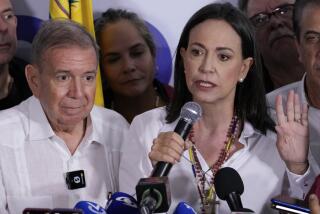U.S. Reacts Calmly to Russian Results : Response: Officials do not see new parliament impeding ongoing reforms. Splintered nature of vote heartens them.
- Share via
WASHINGTON — The Clinton administration reacted calmly Monday to the Communist Party’s apparent success in the Russian elections, saying there is no reason to believe the results will cause any fundamental change in Russian foreign or economic policy.
“We believe that reform in Russia will continue,” declared State Department spokesman Nicholas Burns. At the White House, Press Secretary Mike McCurry said it appeared that the new Duma, the lower house of the Russian parliament, “will not be significant from the old Duma.”
U.S. officials took hope from the fact that the Russian vote was splintered in such a way that no single party will be able to control the Duma.
“Yes, the Communists have picked up a substantial amount of the vote, but it’s also true that three out of four [voters] have not chosen the Communist message,” said one senior administration official. “There is no clear, firm majority winner.”
One reason for Washington’s equanimity was that for the past few weeks, administration officials had been privately predicting a strong showing by the Russian Communists. Sunday’s election results did not come as a surprise.
One U.S. official recalled how the administration was stunned in December 1993 when the forces headed by ultra-rightist Vladimir V. Zhirinovsky polled more than 20% of the vote in an earlier round of elections for the Duma.
By contrast, this year, the American official said: “We expected this [the success of the Communists]. . . . We thought the Communists would have a larger percentage of the vote than other parties, but not enough for a majority.”
Another factor behind the administration’s seeming lack of concern is the fact that U.S. foreign policy could be affected much more by Russia’s presidential elections next June than by the weekend vote for the Duma. It is the Russian president, after all, who has the power to set the course for Russia’s dealings with the rest of the world.
“Foreign policy really was not a big issue in this campaign,” said the senior administration official, who spoke to reporters on the condition that he not be identified.
Still, while putting the best face on the Russian results, administration officials admitted that they are not exactly rejoicing. The Communist Party, after all, favors reconstituting the Soviet Union.
“Any talk of going back to the Soviet Union has got to be opposed by all Americans, and by Russians who believe in democracy,” Burns asserted. He said Russia’s Communists “have an old-order, old-line agenda. And it’s not a positive agenda.”
Moreover, State Department officials grudgingly acknowledged Monday that the election results, as a whole, seem to represent a lack of faith in the current government headed by President Boris N. Yeltsin.
The most important item on the agenda between the United States and Russia over the next few months is an effort to obtain ratification of the START II arms control treaty, signed in the final days of the George Bush administration. The treaty calls for the two governments to phase out thousands of missiles produced during the Cold War.
Sen. Jesse Helms (R-N.C.), chairman of the Foreign Relations Committee, recently agreed to let the START treaty be brought to a vote on the Senate floor within the next month or so. If it is approved, the treaty will then be brought before the newly elected Russian Duma.
Administration officials said Monday that they do not believe the Russian elections harmed the chances for approval of START. “We think that ratification is possible,” one official said.
Administration officials acknowledge that over the next few months, relations between Washington and Moscow will become increasingly dominated by the Russian presidential election.
More to Read
Get the L.A. Times Politics newsletter
Deeply reported insights into legislation, politics and policy from Sacramento, Washington and beyond. In your inbox twice per week.
You may occasionally receive promotional content from the Los Angeles Times.










